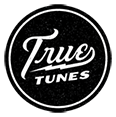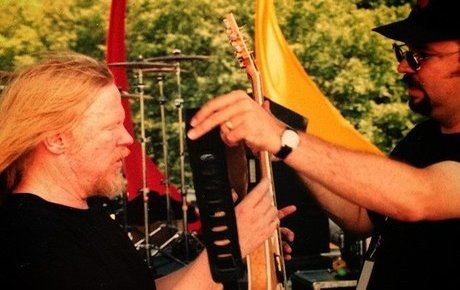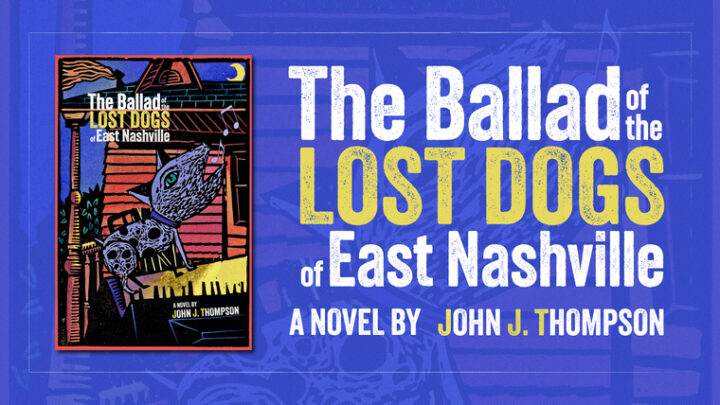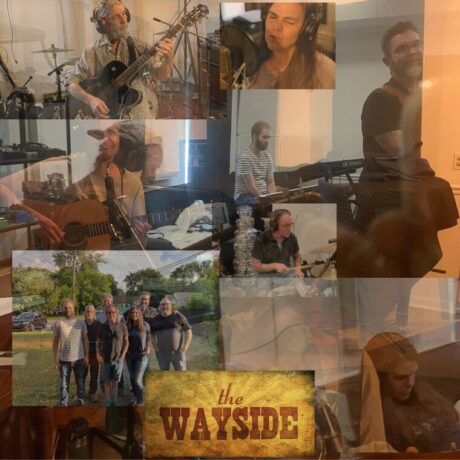Chasing Larry, Finding Grace (Part 2 of 2)
(This is the second installment of a two-part reflection on my experiences with the enigmatic singer, songwriter, and iconoclast, Larry Norman. If you are coming upon this for the first time I highly suggest you go back and read PART ONE first.)
And now we continue with our story…
I had gotten a job as a music buyer at a local Christian bookstore a few weeks after getting home from the Estes Park trip. I got to photograph my hero, Larry Norman, at a concert a year later, when I was seventeen, and was finally able to meet him after the show. By then I had been in that job for over a year and was already building the beginnings of what would become True Tunes a couple of years later. I stocked every Larry Norman title I could find and actively promoted him to our customers. When I finally got to meet him, despite being a newly minted member of the industry, I was star struck and tongue-tied. I told him the story about chasing him around Estes Park the previous summer with an infected toe. He had no reaction at all. I felt like a complete fool. But I went to his merch table and bought a t-shirt anyway.
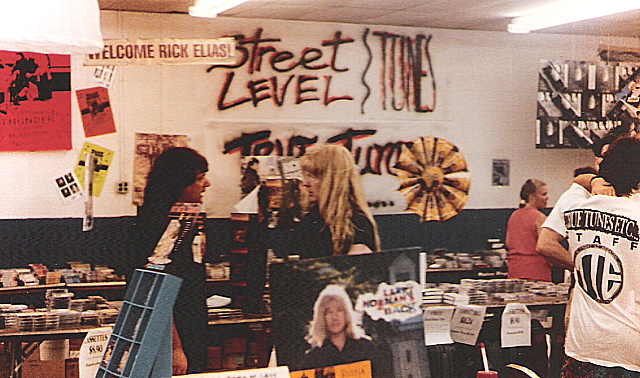
As my career on the fringes of faith-informed music evolved our paths crossed several more times. I fully identified with his outsider status and found several of his albums to be among the most credible examples of the potential of this blending of faith and rock and roll. I carried all of the titles he could offer me through my store and mail order company. In 1990 his manager offered to “allow” me to sell all of his titles (most stores did not sell his stuff at all, so he presented this as a sort of exclusive,) with one catch; I had to agree to also buy several boxes of Solid Rock / Larry Norman Running Shorts.
Yes. Running shorts. The kind you had in gym class in the 1980s. “Larry autographed them all,” his manager said. “You won’t have a hard time selling them.”
I took the deal. True Tunes was your exclusive source of autographed Larry Norman running shorts for several years until I eventually donated them all to the Wayside Cross Rescue Mission in Aurora Illinois. He also sold me all of the cassettes that they hadn’t sold at the festival.
I also met Beki Hemingway that same year at Cornerstone. She was one of Larry’s backup singers, and an impressive artist in her own right, and we became fast friends. She came back through the area with Larry the following year and invited me sit in on a rehearsal before they went over to Michigan for a show. I introduced Beki to one of my best friends are they are still married, 28 years later. Beki is like a sister to me, and I will always appreciate Larry for bringing us together.
Throughout the 90s, as True Tunes grew and the magazine became more influential, I regularly reached out to Larry for an interview. I long wanted to do “the definitive” story on Larry, including his fractious relationships with so many other former friends, some details regarding newly surfaced claims about old injuries that he offered to explain his erratic behavior, and a deep dive into his creative process. I pitched him the chance to be the cover story in True Tunes Newsif he wanted it. I promised a thorough, carefully written, respectful piece, with additional commentary by many other co-conspirators of his day, including his one-time protégée Randy Stonehill, artists like Terry Scott Taylor, Tom Howard, Steve Scott, and others. He told me he’d do the interview several times, but then never followed up. I eventually realized that he did not want to do it. Over the years, as I started to hear more about the strained relationships behind the scenes, I started to guess why. I held the offer out there, though.
At the end of the 90s, when True Tunes was no longer a print magazine, but had migrated completely online, I was checking into my hotel room in Macomb Illinois and getting ready for the Cornerstone Festival, when Larry walked into the lobby. “Hello John,” he said, rather weakly, but pleasantly.” We caught up a bit with some small talk for a few minutes before he brought up the interview. “Would you like to do that interview you’ve been asking about?”
I hadn’t brought up the interview in years, assuming it was a lost cause, so this was a pleasant surprise. “Sure,” I said. “I don’t have a magazine to put you on the cover of anymore, but I do have a new internet radio station called True Tunes Radio. I’d love to do a special on you.”
I suspected he was leading me on.
“How about 4:00?”
“Today?”
“Yeah,” he said, and gave me his room number.
That afternoon my friend Jeremy and I went up to Larry’s hotel room with my digital recorder and finally got that interview. No one ever heard it. My relationship with the owners of True Tunes fell apart, True Tunes Radio ended, and my weekly show on XM Satellite radio wound down. I simply had nowhere to use it.
I just recently found the MiniDiscs and listened back to them, nearly twenty years later. I can hear the enthusiasm in my voice. I wish I had pushed back against a few of his answers a bit more but it was a fun conversation. He flashed back to his earliest childhood memories and to his days writing musicals in LA. He touched on the relationship problems and almost (kind of) took some responsibility for some of the damage.
Almost.
But there was one thing that he said that really stunned me.
“I didn’t know God loved me until 1990.”
Why didn’t I just stop the conversation right there and push in? How could Larry, after all those years, miss that critical point? He spoke about believing in God, about salvation, about working hard, and about preaching the Gospel. But behind it all was a sense of duty – almost the essence of a kid trying to earn his father’s approval (a tone Thornbury picks up on strongly throughout his book.) Here was this man, suffering in health, sounding lonely, tired, at times frustrated, and at other times resigned, who though he had been preaching God’s love for forty years, really hadn’t experienced it personally. How is that possible?
I think it’s pretty easy to miss, actually.
The thing that frustrates me most about Larry’s story, and about both his fans and detractors’ reactions to its telling, is the often binary and dualistic tendency to paint him as either a persecuted, victimized, prophetic saint, or a twisted, derivative, deceptive villain. I think the truth is much more complicated. Is it possible that one man can be both creatively inspired and personally destructive? Is it possible that one man can be an excellent communicator from stage and yet have a hard time relating to individuals off stage? Might the very instincts that help an artist build a successful image and style also potentially place him at odds with reality from time to time? Could it be that Larry Norman was an excellent artist and a difficult human being? Would that make him all that unique amongst artists? Is it possible that God used him despite his failings? Would that make him all that unique amongst Christians?
While Thornbury’s book certainly unearths more details about Larry’s childhood, and gives a much more granular account of Larry’s perspective on the drama surrounding the detonation of his personal and professional relationships, his choice to only use Larry’s archives as his source material locks this book into one side of the story. Although it acknowledges more warts than most Larry fans are often willing to consider, (most notably the existence of a child Larry seems to have fathered out of wedlock,) when it comes to the bulk of the drama we are only given a detailed tour of Larry’s perspective on things. In the process, Thornbury spends an inordinate amount of time throwing shade, in particular on Randy Stonehill and Pamela Newman, Larry’s first wife. This is most unfortunate.
Again, I’m not objective. I knew all about Larry’s challenges. I wrote about him in my book Raised By Wolves almost 20 years ago and I will explore his complicated legacy in much more detail when I re-issue that book soon. Though I got one bit wrong (Larry corrected me that it wasn’t baggage that fell on his head on that plane, but a section of the actual ceiling of the cabin,) and he disagreed with my assessment that maybe he wasn’t a good businessman, generally speaking he appreciated my book. In fact, he asked me, several times, after this interview at Cornerstone, if I would write an exhaustive biography of his life for him – with his full cooperation. I told him I would, if he would allow me to include the perspectives of the others involved in his story. He agreed. He also agreed not to edit me or require approval. He honestly seemed ready to leave the past behind, and felt that getting the whole story out there would help with that. Part of getting over the past, I told him, has to do with forgiveness, though. We discussed that very fact during the interview. He told me that he had asked for forgiveness from everyone he had wronged. He seemed ready for everything to just be done. Times had changed. He and Randy later allowed me to interview both of them for the first joined interview they had done since their falling-out, for a cover story on Christian Musician Magazine.
I was able to help engineer what became Larry’s last full-band concert in the U.S. when he came to play at Cornerstone 2001. Thornbury mentions that bit, but says that the festival insisted that he only played his old hits. The truth is that we had suggested to Larry that we allow the fans to vote on the set list on the festival’s website and he seemed to love that idea. We also wanted him to use a full rock band, as he had played several times at the festival acoustically in the previous years. “I don’t have a band,” he told me on the phone. “You can use mine!” I said. My band specialized in classic roots rock anyway. So my band, The Wayside, learned about 20 of Larry’s songs ahead of time and I arranged for a rehearsal the day before the show at a church in Macomb, IL. I also arranged for Dan Michaels of The Choir to join us on saxophone. Larry surprised us by bringing his brother Charlie’s Euro-pop band to back him up on half of the set, and he added a couple of extra guitarists. But on my 31st birthday I got to be Larry Norman’s band leader and acoustic / rhythm guitar player on the Main Stage at the Cornerstone Festival. There’s just no other way to say it. That was awesome.
When we got off the stage and Larry caught his breath, he came up to me beaming. “We have to do that again!” he said. “We need to do a tour!”
“How about we start with one more show?” I suggested. “We’ll do it in Chicago, this fall. But this time, no surprises!” He laughed and we gave each other a sweaty hug. The plan was for me to put together a full-length show for the fall, with my band backing him up for most of it, and a decent acoustic set in the middle. We talked about doing a good recording of it as well. That show never happened. Although he did make one more trip to Europe, his health took a serious slide shortly thereafter and the window closed.
I care deeply about the Larry Norman story, not least because I care deeply about the Gospel story that Larry helped make me so excited about. The grace God lavishes on us is just crazy. Larry didn’t deserve that grace. I don’t deserve that grace. But we get it anyway. But Larry’s story doesn’t need sanitization. The more I got to know Larry the more I came to appreciate that fact. If it’s true that he didn’t know that God really loved him that’s a real tragedy. The only way I experience God’s love tangibly, though, is through His people. Being connected to a group of people – the “Body of Christ” as it were – is the only way I can actually feel that love. I can sense it a bit in nature. I can brush up against it in literature or art. I can consider it when I read the Scriptures. But I only feel it when I allow other people to love me for Him.
Larry had a hard time with the Church. I get it. I really do. But when we remove ourselves from God’s people we remove ourselves from one of the most important ways we can have our hurts addressed. We don’t need to limp through this life alone, hiding our pain, pretending it isn’t there, changing our own bandages in secret.
We are each responsible for our words and our actions. We need to try not to hurt people, and to seek forgiveness and restoration when we do. We need the perspective of others to help us stumble toward the truth. But the saddest thing of all might be when we miss out on the love and joy available to us in this short life because we won’t admit to the infection that cripples us and ask for help. We won’t let the doctor clean the wound. But what we think is hidden, will someday be revealed. We’re probably not hiding it as well as we think, anyway. Our limps give us away.
-JJT
PS – I plan to release the audio and a transcript of my conversation with Larry as a part of an upcoming Updated and Expanded 20thAnniversary Edition of my book Raised By Wolves, which will also include a lot more new content and many improvements over the version that came out in 2000. I will be making an announcement about that soon. Please subscribe to our email list to make sure you get all the updates. You might also want to follow our brand new Facebook group @TrueTunesNow and make sure to check out the upcoming True Tunes Podcast for excerpts of that conversation with Larry.
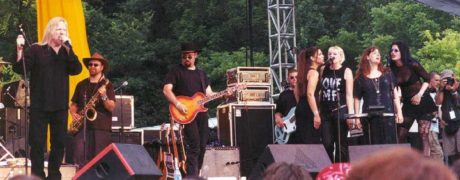
Here’s a fun video clip of one of the songs from that sweaty show:
